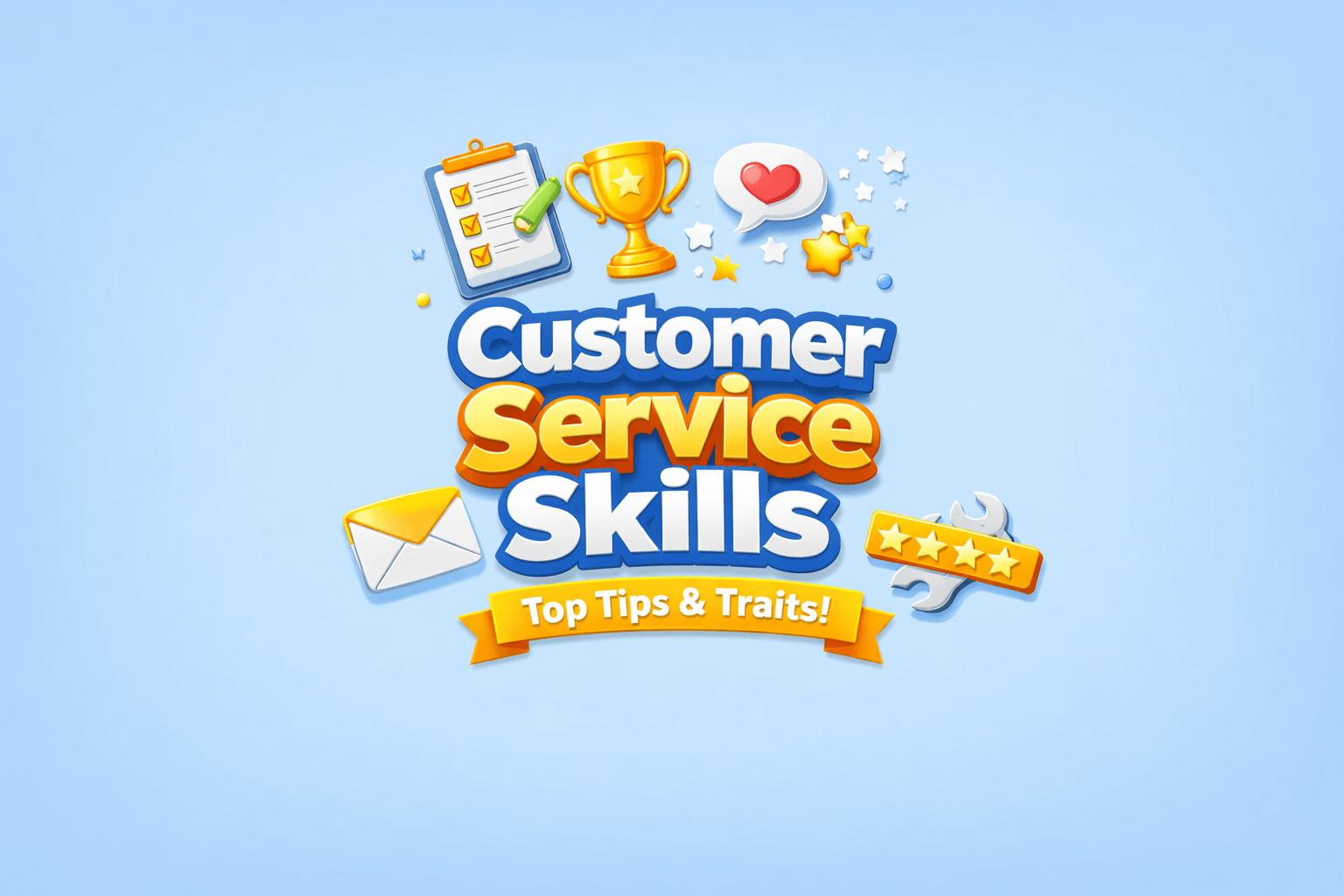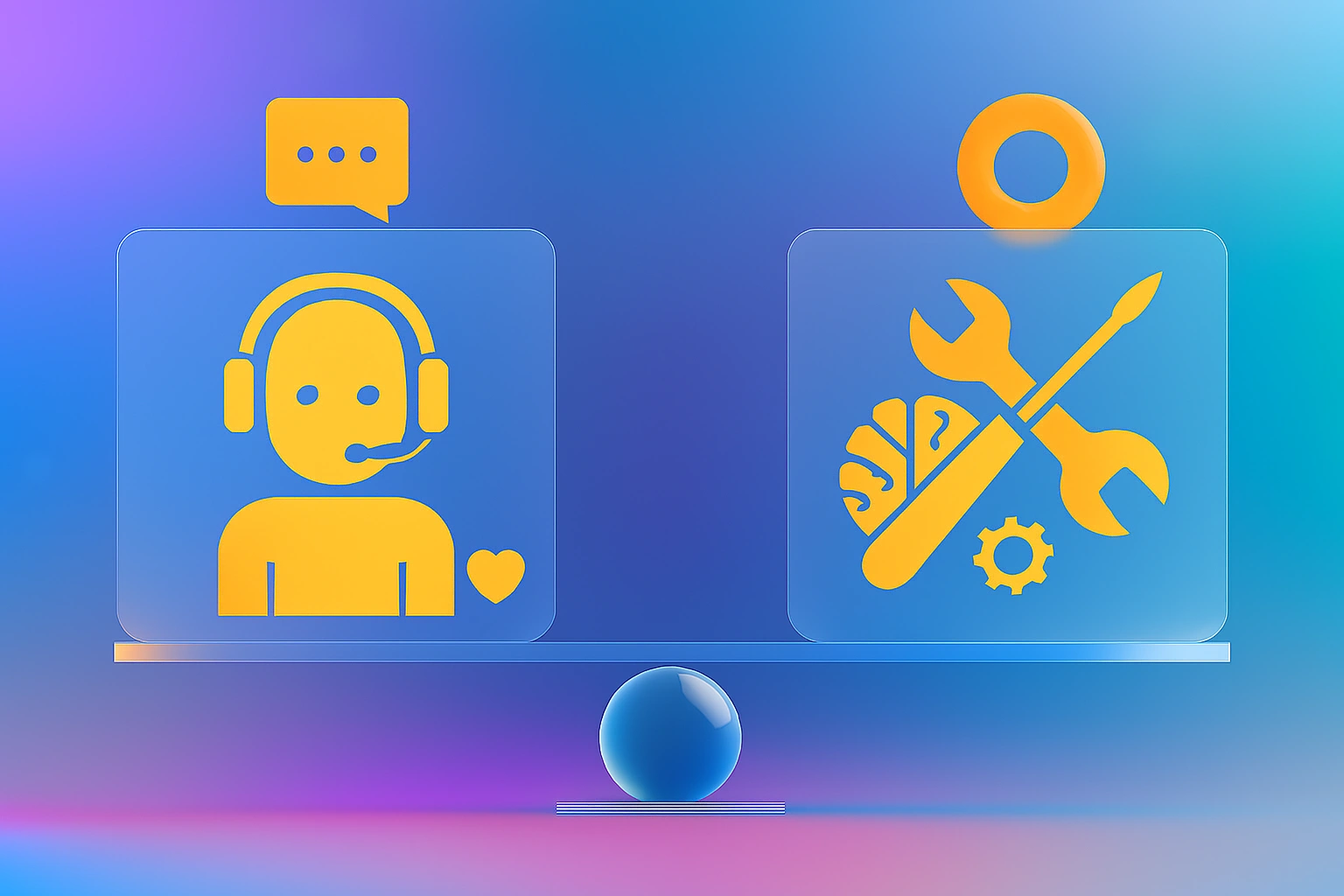Improving B2B Customer Experience – Stats, Trends & Examples
- October 10, 2023
- 12 mins read
- Listen

For customers, experience is everything. To them, it matters more than price or product quality. They will stick with a brand if the experience is great and they won’t hesitate to move on when the experience is not up to the mark.
CX is obviously now a big differentiator for getting customers in the B2B space. With the business-to-business landscape evolving by the day, offering great experience will soon be the way to growth and success.
So, if you’re in the highly competitive B2B space, the key is to let your customers embrace the experience and feel happy with the value they get. It’s important to consider experience at each stage of the buyer’s journey and create value as and where expected.
In this blog, we will explore the B2B customer experience in detail, understand the trends, see some examples, and learn tips to improve it.
But first, let’s get started with understanding what B2B customer experience is…
What is B2B Customer Experience?
B2B Customer Experience (CX) is all about business customer interactions while engaging with another business as a customer. It includes all touchpoints of the buyer’s journey and focuses on delivering value and a positive impression to B2B clients. One of the key purposes of business-to-business experience is to foster long-term relationships with customers and drive growth.
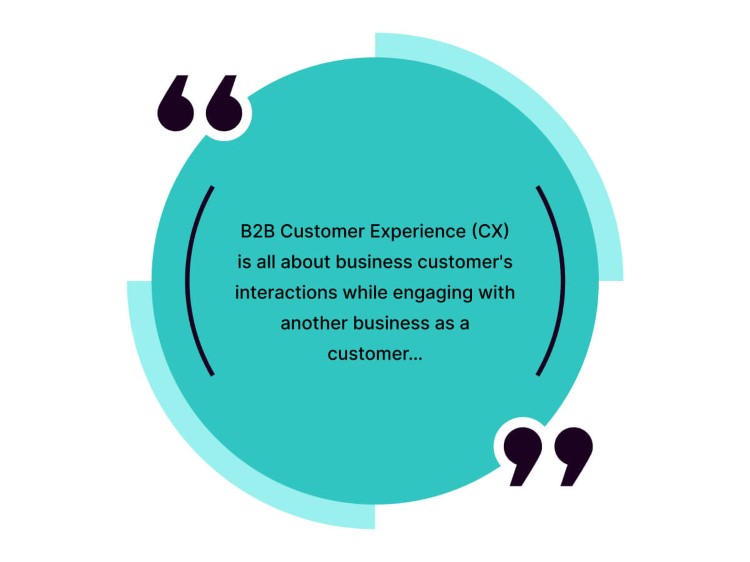
Key aspects of B2B customer experience include –
- Putting a strong emphasis on building and nurturing long-term relationships
- Understanding the needs and challenges of customers and tailor products accordingly
- Matching each client’s specific requirements through personalization
- Simplifying and streamlining the entire process of doing business for B2B clients
B2B Customer Experience Statistics
B2B customer experience statistics is a vital tool for understanding various things related to how customers interact with businesses. It will also help companies gain insight into customer preferences and behavior. The data gained can be used for making informed decisions about the ways to improve customer service.
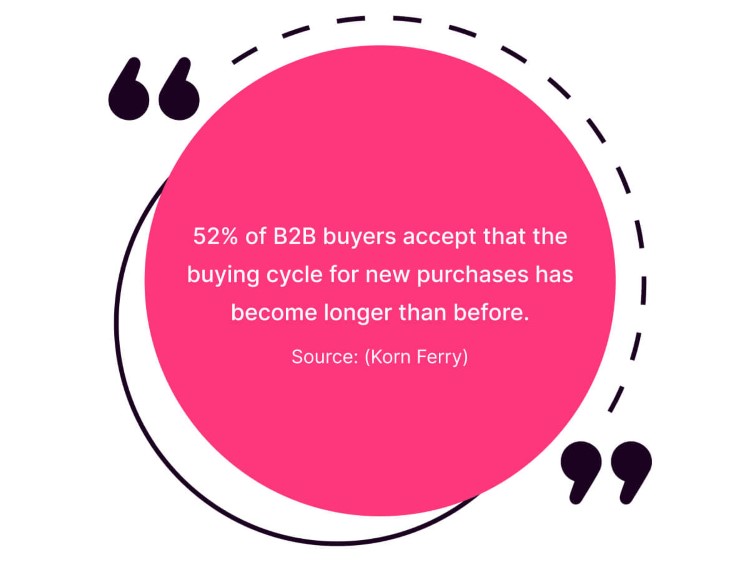
Here are key B2B customer experience statistics for your business –
- 52% of B2B buyers accept that the buying cycle for new purchases has become longer than before. (Korn Ferry)
- More than 30% of B2B buyers believe that the pandemic has helped increase collaboration among decision-makers. (TrustRadius)
- 86% of B2B buyers are willing to pay more for a great customer experience. (SuperOffice.com)
How to Improve B2B Customer Experience?
B2B customers have evolved and they want more than just great products. They expect companies to prioritize customer experience together with delivering value with the purchase. To achieve a superior customer experience target, a business must take additional steps and keep service at the core of operations.
Here are some of the ways to improve B2B customer experience –
1. Understand Your Customers
Understanding your B2B customers is always the key to delivering them great experiences. In fact, a business that continuously makes an effort to understand its customers is better able to deliver improved experiences than others. The key is to become aware of the needs, tastes, and preferences of your target audience and then deliver value as per those needs.
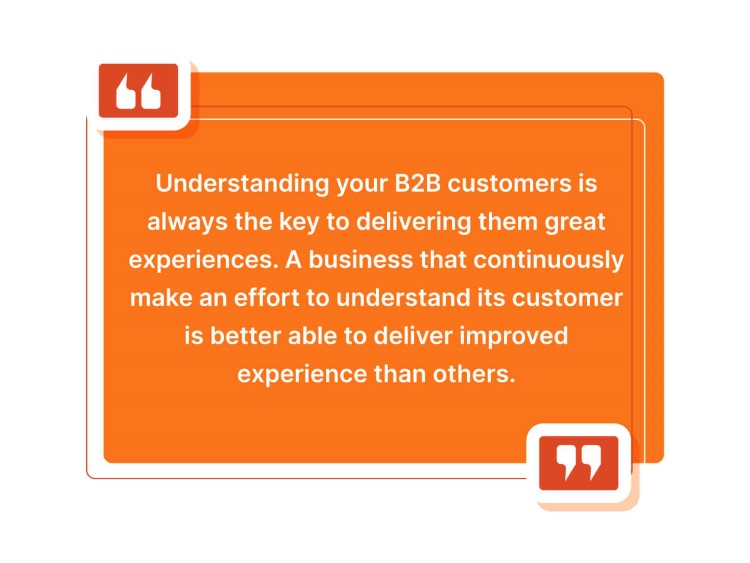
How to better understand your B2B customers?
- Create detailed buyer personas based on research and data as it will help you know the challenges, goals, and pain points of your audience
- Use these personas strategically for tailoring your message and solutions
- Regularly gather feedback on customer experiences with your product or service
- Devise marketing campaigns that resonate with the needs of each persona
2. Examine Your B2B Customer Journey
Examining the B2B customer journey stages is always vital for improving the customer experience. This journey has several stages and each stage gives you the opportunity to engage and provide value to your customers. With a good understanding of the customer journey at each stage, you will be able to tailor your strategies and effectively meet customer needs. This is how ultimately a business is able to create a seamless experience for its B2B customers.
Key takeaways
- In the awareness stage, your role is to make your solutions known to your customers
- In the consideration stage, your role is to provide content that helps customers understand their problems better
- In the decision stage, present your offers as the best solution for the specific needs of your customers
- In the purchase stage, your role is to ensure a smooth purchasing process for customers
3. Streamline the Buying Process
Customers can feel frustrated when the purchase process is complex or convoluted. This kind of purchase process might force them to seek solutions elsewhere. So, you should focus on simplifying and optimizing every step of the buying process for your B2B customers. The goal should be to reduce friction from the sale process and make it easy for customers to do business with you. When you manage a streamlined buying process, it not only leads to improved customer experience but also drives conversion rates.
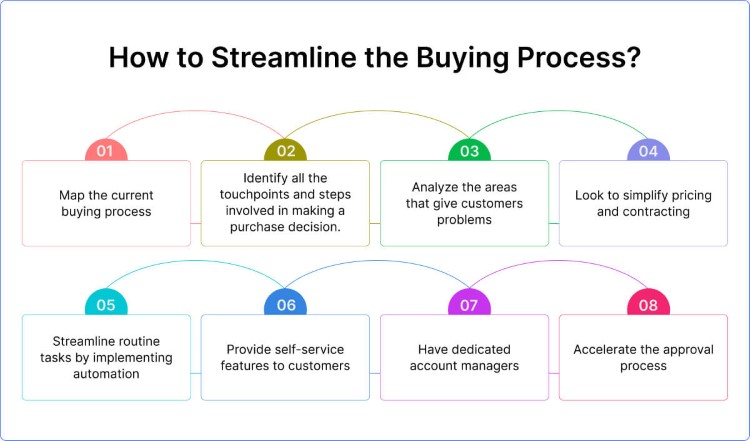
Tips to streamline the buying process
- Map the current buying process and identify all the touchpoints and steps involved in making a purchase decision
- Analyze the areas that give customers problems and then look to simplify pricing and contracting
- Streamline routine tasks by implementing automation and providing self-service features to customers
- Have dedicated account managers and accelerate the approval process
4. Build Trust with B2B Buyers
Building trust is essential for improving the B2B customer experience and gaining the confidence of your target audience. When you are trusted by businesses, it can win you a competitive advantage in the market. However, building trust is easier said than done as it’s an ongoing process and requires consistency and this is where most businesses falter. If you want to build trust, the only thing that matters is to develop a genuine commitment to serving your customers well and meeting their needs.
Measures to build trust with B2B customers
- Maintain consistency in delivering on your promises and be transparent in your actions and commitments
- Always provide clear and accurate information about products, pricing, and terms, and always stay responsive to inquiries
- Look to address issues promptly and always treat customers with respect.
- Use effective communication channels to get your messages across and keep the branding across all touchpoints
- Offer excellent customer support for quickly resolving customer issues and seek customer feedback on a regular basis
5. Provide Exceptional Customer Service
Customer service is key when it comes to improving B2B customer experience. The purpose of customer service goes well beyond just resolving issues in a prompt manner as its focus should be on building strong relationships with your customers. To provide excellent service, you first have to anticipate needs and show a genuine commitment to the customer’s success. This will help you gain customer loyalty over time, driving sales and conversions along the way.
How to provide exceptional customer service?
- Provide various support channels and dedicated account manager to key clients
- Regularly track and manage customer inquiries through a ticketing system
- Tailor your support to the specific needs and preferences of customers and ensure personalized experiences for them
- Have a trained support team that manages customer interactions with a sense of empathy
- Offer 24/7 support to meet customers’ needs across regions and time zones
6. Educate and Inform Your Customers with Quality Content
As a business, it’s your responsibility to educate and inform your B2B customers so that they can get a better understanding of your products or services and make informed choices. By offering educational content, you can establish yourself as a trusted resource, solve their problems, and empower them to make sound decisions. When customers are educated about your products and services, and when they have sufficient knowledge of the process and systems at your end, they are more likely to stick with you and purchase.
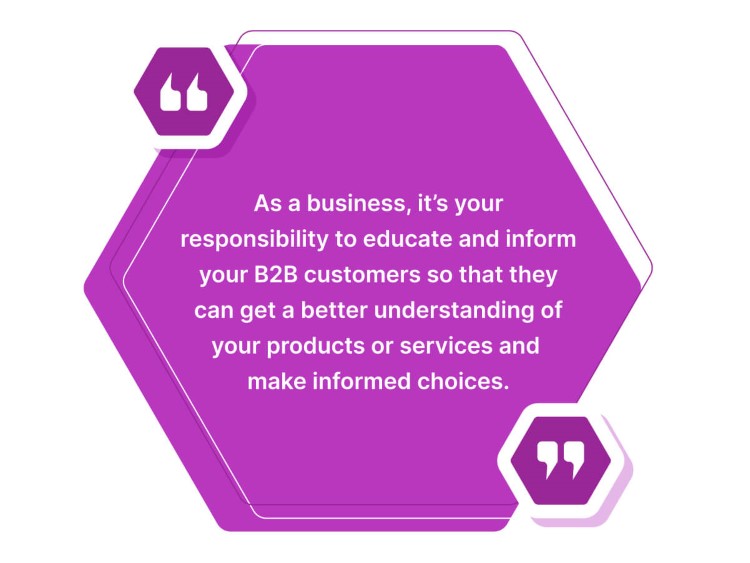
Tips to educate and inform customers
- Assess the needs of your B2B customers, understand the challenges they face, and plan your content strategy to fill the knowledge gap
- Focus on creating content around topics and areas where your customers need help and guidance
- Develop a well-planned content calendar and craft various types of content pieces to cater to customers in different stages of their buying journey
- Produce only high-quality content that is relevant and that adds value to your audience
B2B Customer Experience Trends
Times have changed and we are quite far away from the days when people were just happy with a simple transaction. Today they want more – they want personalized experiences. Above all, customers now want to be valued and this can never be possible unless a business considers CX. That’s why more businesses look to invest in boosting B2B customer experience. Here are some of the latest B2B customer experience trends to know –
1. Delivering personalized experiences is becoming a necessity
Companies are now realizing that each of their customers is unique, so they focus on tailoring the sales journey to the unique goals of the customers. This is driving the rate of personalized interactions. More so, more businesses plan to offer customized journeys through preferred channels so that customers don’t switch elsewhere for better experiences.
2. Omnichannel support strategy is gaining more traction
Customers now expect businesses to be available on different channels simultaneously so that they can get a quick response anytime and on any channel of choice. Be it a website, mobile app, social platform, or live chat, a customer can reach a business from any source and they expect businesses to prepare for that. This is why more companies look to deliver an omnichannel support strategy for enhanced support.
3. Data-driven insights are more in use than earlier
There can’t be a better way than data to understand customer behavior, needs, and preferences. By using customer-centric data, a business can not only identify areas for improvement but can also customize the experiences to the specific needs. So, more businesses now use data to better understand the customer journey and adjust their engagement strategy accordingly.
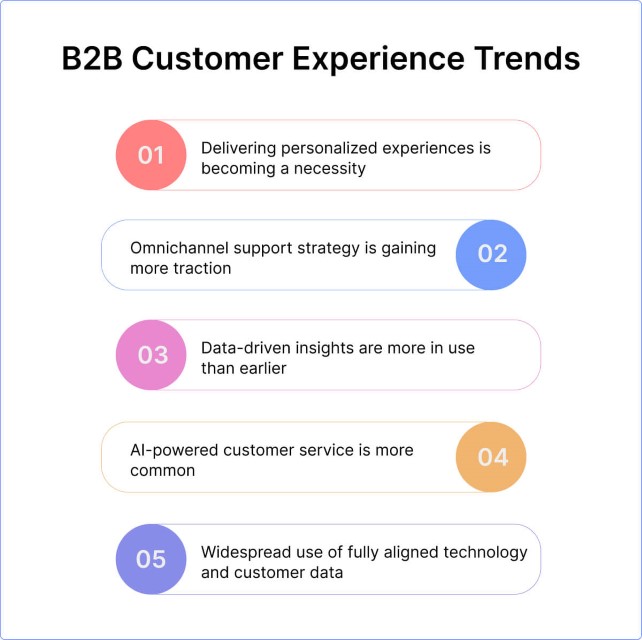
4. AI-powered customer service is more common
The arrival of AI-powered technologies has changed the landscape of customer service. Businesses now find it easy to engage with their customers without having to invest heavily in manpower. But, how AI can improve customer experience? Artificial intelligence chatbots are used to automate various tasks across support and also to swiftly engage and guide customers through the buying journey. Self-service portals and automated email communications are other major aspects of AI that are changing customer support.
5. Widespread use of fully aligned technology and customer data
Customers value experiences more than anything else. One aspect of offering great experiences to customers is remembering their previous interactions. This can’t be achieved unless you have a seamless internal alignment across departments. Since a buyer may interact with different people during their journey, it’s important that all your teams collaborate together with fully aligned customer data and technology to enhance experiences.
B2B Customer Experience Examples
When customers purchase from you, they expect a great experience and they also expect to have a smooth buying journey. Many companies understand the value of offering amazing services to B2B customers. In fact, those offering improved customer experience witness a lower level of customer churn and lower service costs.
Here are some B2B customer experience examples –
Salesforce
Salesforce knows how to offer a personalized B2B customer experience and make the whole journey smooth for customers. The company offers a big online community where customers can get access to various types of resources such as training materials, knowledge base, forums, etc. Above all, the company has a policy of assigning dedicated account managers to ensure tailored support to each client.
IBM
IBM is a great example of customer experience. The company has a policy of assigning every customer a team of experts to set up its cloud storage product. In addition, they also believe in the concept of training customers about the best use of their products. Apart from that, IBM also encourages customers to share feedback on their products and services so that it can further improve the experience.
ING
ING is a well-known bank that gives customers the opportunity to transact anywhere in the world. To ensure a great customer experience, it lets them reach out to support teams in multiple languages. It also offers omnichannel support where it lets customers reach them from any channel of choice and engage them better.
FedEx
FedEx stands out when it comes to redefining customer experience as it uses various innovative ways to help customers at each step of the way. From doing regular follow-ups to collecting feedback to providing support, it makes sure that B2B customers always get the kind of experiences they deserve. The best part about its improved customer experience is the kind of streamlined communication it does for both internal teams and customers.
Final Thoughts
Customers are evolving by the day and their expectations for support keep growing as well. For a business, the key is to guide customers through the buying process, provide help at each step of the way, and remove all the bottlenecks from the way.
With REVE Chat, you can find a variety of support tools to engage your customers better than ever before.
You can sign up with us and check how our AI-powered tools can contribute to offering amazing experiences to your B2B customers.


